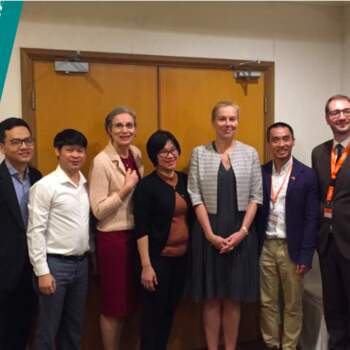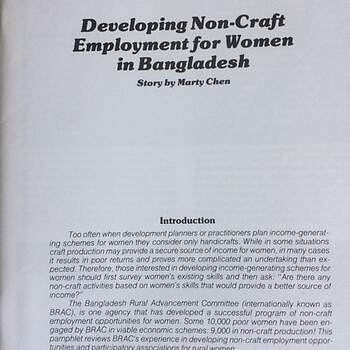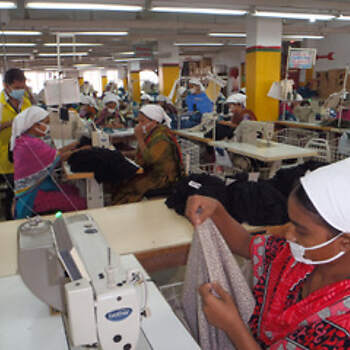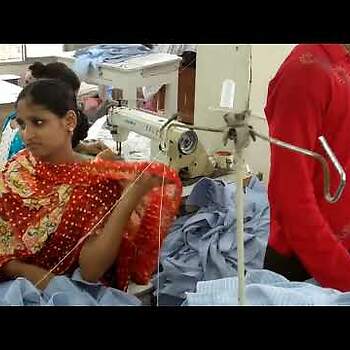Dutch support to women formal workers/employees – 1970s to 2000
The term formal women workers/employees is generally used for women who have a formal employment relationship with an employer. Only 7% of women aged 15 years and up are employed as wage workers in low-income countries, compared to 18% of men. This includes public and private sector jobs as employees, formal and informal. (World Bank Gender data portal).
Dutch support for women formal employees started in 1991. During a seminar on Women in Development, then Minister Pronk acknowledged that in the area of economic policy, the focus on self-employed women led to the exclusion of women employees. In the context of increasing globalization, more and more Northern companies were either producing in or trading with Southern countries. Women became an important segment in the labor force in export processing zones, factories or plantations. Pronk committed to adapt the MFA development policy and highlight the issue of labor conditions for men and women on the international trade agenda.
Shortly before this, in 1990, MFA had financed the appointment of gender experts at the international departments of the two largest trade union confederations of the Netherlands, the FNV (Social Democratic Trade Union Confederation), and the CNV (Christian National Trade Union Confederation). During the second feminist wave in the 1970s, the FNV Women’s Union had adopted a feminist strategy towards women’s issues in the Netherlands. These initiatives were an inspiration for organizations worldwide. For example, in El Salvador an organization inspired by the FNV women’s vocational schools, started courses for women in car mechanics, and a group of these women started their own car-repair company.
In 1994 the gender experts at the international departments of FNV and CNV published a gender analysis of the (international) sectors with the highest participation of working women: agriculture, free trade zones, and the informal sector. This study contributed to a shift in the use of solidarity funds of these Dutch trade union confederations and increased their focus on women’s empowerment in the labor market.
The International Labour Organization is the international forum for labor standards, with a unique tripartite governing structure that brings together governments, employers, and workers of its 187 member states. Its International Labour Conference meets annually to formulate international labor standards. The ILO workers organization played a key role in the area of women’s rights. At the ILO Conference in 1993, the gender expert of FNV-International was selected for the tripartite negotiations on an ILO Resolution for Technical Cooperation. She ensured a gender equality perspective in this resolution. FNV staff also played a key role in the formulation of ILO Conventions 156 (on work and family responsibilities) and 183 (on maternity protection). The lobby and advocacy by many women’s organizations worldwide, resulted in 1996 in the ILO Convention 177 (on Home-based Work).
Women’s labor conditions were also addressed by the four Dutch NGOs (Cordaid, ICCO, HIVOS, OxfamNOVIB) that regularly received funding from MFA, as so-called ‘Medefinancierings-organisaties’ (co-financing organizations). These NGOs supported a variety of interventions by their local partner organizations across different continents to improve women’s labor rights. They organized training, supported local trade unions, lobbied their governments or advocated against malpractices by companies in agri-business, mining or the textile industry.
Dutch support to formal women employees – 2000 to 2022
MFA continued to fund the international work of the Dutch trade unions FNV and CNV from 2001 -2016 through three successive programs. These programs paid attention to women’s rights. They sought to enhance women’s participation in (traditionally male-dominated) local trade unions, improve women’s access to the labor market and improve women’s working conditions. An IOB evaluation in 2008 (in: IOB 2015) showed that efforts to increase women’s membership and leadership in local trade unions had had mixed results. In 2021, an external evaluation of the FNV international program found that the trade union had managed to put gender-based violence on the agenda in their program countries. The program had also enabled local trade unions and labor NGOs to undertake successful activities addressing gender-based violence and sexual harassment in the workplace.
From 2008, with the renewed policy priority for women’s rights and gender equality, and especially after 2013 when gender mainstreaming was intensified, attention for women workers was intensified in the DDE programs supporting the private sector -in the Netherlands and in developing countries- to undertake development related activities. Minister Ploumen emphasized that distinct strategies were needed for women entrepreneurs and women employees (whether formal or informal), and DDE subsequently made this distinction explicit in its theory of change.
Attention for the plight of many women workers got an alarming impulse when in 2013 the Rana Plaza garment factory in Bangladesh collapsed, with a death toll of over 1100 and about 2500 workers injured, the majority women. Minister Ploumen took a leading role, together with her colleagues in six EU countries, to respond to the catastrophe. Their efforts contributed to the creation of a fund for compensation to victims. Moreover, an Accord on Fire and Building Safety in Bangladesh was signed. It is an independent, legally binding agreement between brands and trade unions to work towards a safe and healthy garment and textile industry in Bangladesh. The Accord was renewed in 2018 and is still in force. DDE staff had an important role in these processes.
The Rana Plaza crisis put the topic of decent work for women firmly on the MFA agenda. The topic was also taken up by NGOs seeking Dutch support through the Strengthening Civil Society program. And DDE started mainstreaming it in its sustainable value chain strategies. Moreover, decent work played a role in the negotiations on the International Responsible Business Conduct Agreements (see bullet 13), notably the first one on garments and textiles.




